Politics
YPG terrorist leader insists on decentralized Syria, name change
Doubling down on the terrorist group’s separatist ambitions, YPG leader Ferhat Abdi Şahin has renewed his calls for a decentralized Syria and the removal of “Arab” from the country’s official name.
In an interview with the Istanbul-based Yeni Yaşam newspaper, Şahin argued that the “Syrian Arab Republic” title, in use since 1961, “does not reflect the reality” of the multiethnic nation and should have the word “Arab” removed.
“Syria does not belong only to Arabs. Such radical changes must be made in Syria,” he said.
“(Syria) cannot be centralized and totalitarian like it was during the Baath regime. It must be a decentralized Syria. All provinces in Syria must be able to govern themselves through local governments,” Şahin claimed.
Just last week, Şahin told local media the YPG “defends the slogan ‘one army, one government, one state,’” echoing Damascus’ calls for full national unity.
The shift in tone comes as the group continues to negotiate with Syria’s interim government over the implementation of a March 10 agreement recognizing Damascus’ sovereignty.
Under the deal, signed by Syrian interim President Ahmed al-Sharaa, the YPG pledged to recognize Damascus’ sovereignty and transfer airports, oil fields and border crossings under its control to the central government by the end of the year.
However, the agreement stops short of outlining how the YPG’s armed wing, the Syrian Democratic Forces (SDF), will be integrated into Syria’s army, a key sticking point. Damascus insists fighters join individually, while the YPG demands entry as a bloc, an issue that threatens to stall the process.
The YPG is the Syrian offshoot of the PKK, which has waged a decadeslong terror campaign in Türkiye and is designated a terrorist group by the United States, the European Union and Türkiye.
With U.S. support under the pretext of fighting Daesh, the YPG seized large swaths of northern and eastern Syria during the civil war. Turkish cross-border operations have since reduced its territorial grip, but it still holds key oil, water and agricultural resources in the northeast.
Washington has recently acknowledged the group’s ties to the PKK, with Tom Barrack, U.S. ambassador to Ankara and special representative for Syria, claiming the U.S. has no obligation to support “the formation of an independent state by the so-called SDF.”
Last month, Barrack also dismissed federalism as a workable model in Syria.
“The problem is that in all these countries (Iraq and Syria), federalism does not work and that a state within a state cannot be established,” Barrack said.
The U.S. envoy has urged Damascus to maintain “one homeland, one nation, one army, one government,” accusing the YPG of being reluctant to fully commit to national unity.
Şahin, however, claimed that a decentralized structure is essential for stability.
“(Barrack) understands that Syria cannot be governed by one person … I hope he has concluded that a decentralized Syria is necessary,” Şahin said.
The YPG’s push for decentralization and symbolic changes, such as altering the country’s name, is widely seen by Türkiye as part of a broader effort to entrench separatist control in Syria’s north.
Ankara has long opposed the YPG’s presence along its border, warning it will “intervene” if the group does not comply with the March 10 deal and disarm as the PKK did.
As part of the landmark terror-free Türkiye initiative, the PKK announced in May it would disband and renounce armed conflict, ending four decades of violence.
Politics
Turkish FM Fidan to visit Egypt to discuss Israel’s Gaza plan
Foreign Minister Hakan Fidan is set to travel to Egypt on Saturday for a series of talks with senior officials on Israel’s plans to take control of Gaza City and the humanitarian situation there, a Foreign Ministry source said on Friday.
Israel’s political-security Cabinet approved a plan early on Friday to take control of Gaza City, as it expands its military operations despite growing domestic and international criticism over the devastating, almost two-year-old war.
NATO member Türkiye, which has said Israel’s assault on Gaza amounts to a genocide and halted all trade with it, condemned the plan of Prime Minister Benjamin Netanyahu’s “fundamentalist government,” and urged world powers and the United Nations Security Council to act to prevent its implementation.
During his visit to Cairo, Fidan will meet Egyptian President Abdel-Fattah el-Sissi and other officials to discuss bilateral ties and regional issues, including the Gaza cease-fire negotiations, mediated by Egypt, Qatar and the United States, as well as Israel’s takeover plan, the source said.
Fidan will “evaluate joint efforts to end the genocide in Gaza and allow the unhindered access of humanitarian aid into Gaza, emphasize that the occupying Israel’s actions targeting a two-state solution and its latest steps toward the annexation of Gaza are the biggest obstacle to regional peace and stability,” the source said.
Ankara has praised Egypt, Qatar and the U.S. for their mediation efforts between Israel and the Palestinian group Hamas, whose attack in 2023 prompted Israel’s genocidal war on Gaza, killing over 60,000 people, mostly women and children. It has rejected any Gaza takeover plans or attempts to displace Palestinians.
Fidan will also discuss developments in Africa, including in Libya, Sudan and Somalia, the person added.
Politics
Trump to host Azerbaijan, Armenia to sign US-brokered peace deal
U.S. President Donald Trump is set to host Azerbaijani President Ilham Aliyev and Armenian Prime Minister Nikol Pashinyan at the White House on Friday for the signing of a U.S.-brokered peace agreement aimed at formally ending decades of conflict between the two South Caucasus neighbors.
Trump said Pashinyan and Aliyev would also be signing agreements with the U.S. to “pursue Economic opportunities together, so we can fully unlock the potential of the South Caucasus Region.”
“Many Leaders have tried to end the War, with no success, until now, thanks to ‘TRUMP,'” Trump wrote Thursday night on his Truth Social site.
The prospective agreement could potentially put an end to decades of conflict and set the stage for a reopening of key transportation corridors across the South Caucasus that have been shut since the early 1990s.
Three U.S. officials, who were not authorized to speak publicly ahead of the announcement and spoke on condition of anonymity, said the agreements included a major breakthrough establishing a key transit corridor across the region, which had been a hang-up in peace talks.
The agreement, according to the officials, would give the U.S. leasing rights to develop what is known as the Zangezur Corridor and rename it the “Trump Route for International Peace and Prosperity.”
It would link Azerbaijan to its Nakhchivan region, which is separated from the rest of the country by a 32-kilometer (20-mile) patch of Armenia’s territory.
The transit corridor is expected to eventually include a rail line, oil and gas lines, and fiber optic lines, allowing for the movement of goods and eventually people. The deal does not call for the U.S. to pay for the construction of the transit corridor, but instead for private corporations to develop it.
The deal was reached after a visit earlier this year by Trump’s special envoy Steve Witkoff to Azerbaijan’s capital of Baku and continued talks between the parties.
Karabakh dispute
Armenia and Azerbaijan faced off for nearly four decades of fighting for control of the Karabakh region, which was known internationally as Nagorno-Karabakh.
During the Soviet era, the mostly Armenian-populated region had an autonomous status within Azerbaijan. Long-simmering tensions between Christian Armenians and mostly Muslim Azerbaijanis boiled over as the Soviet Union frayed in its final years.
Clashes erupted in 1988 when the region made a bid to join Armenia. As the USSR collapsed in 1991 and Armenia proclaimed independence, hostilities escalated into a full-blown war that killed an estimated 30,000 people and displaced about 1 million.
When the war ended with a cease-fire in 1994, Armenian separatist forces backed by the government in Yerevan not only took control of the region but also captured broad swaths of Azerbaijan.
Decades of international mediation efforts failed. In September 2020, Azerbaijan launched an operation to reclaim the region. NATO-member Türkiye, which has close ethnic, cultural and historic bonds with Azerbaijan, gave it strong support.
In six weeks of fighting involving heavy artillery, rockets and drones that killed more than 6,700 people, Azerbaijani troops drove Armenian separatists from areas they controlled outside Karabakh. They also reclaimed broad chunks of Karabakh. A Russia-brokered peace deal saw the deployment of about 2,000 troops to the region as peacekeepers.
Azerbaijan then reclaimed all of Karabakh in September 2023 in a lightning military campaign. Over 100,000 people returned to Armenia in a week.
Russia, busy with its war in Ukraine, didn’t intervene, angering Armenia’s leadership, which responded by scaling down its ties with Moscow and bolstering relations with the West.
After reclaiming Karabakh, Azerbaijan engaged in talks with Armenia on normalizing ties. As part of the negotiations, Armenia agreed to hand over several border villages to Azerbaijan.
Azerbaijan also has demanded that Armenia rewrite its constitution, which contains a reference to the prospective reunification of Armenia and the Karabakh region. The authorities have yet to present a revised draft in the face of public protests.
A key stumbling block in peace talks was Azerbaijan seeking a land bridge to its Nakhchivan region. Azerbaijan doesn’t trust Armenia to control the Zangezur corridor, while Armenia has staunchly resisted control by a third party, seeing it as a breach of its sovereignty.
It was not clear how that resistance had been overcome in the deal.
Russian influence
Russia, which has a military base in Armenia, had previously proposed deploying its troops to secure the corridor. Armenia, bent on scaling down ties with Russia in favor of closer relations with the West, rejected the idea.
“Russia has been left on the sidelines, because the Kremlin has nothing to offer to Armenia and Azerbaijan,” said Olesya Vartanyan, a South Caucasus expert, noting that Moscow’s regional influence withered after it focused on the war in Ukraine.
“Russia now lacks resources to deal with Armenia and Azerbaijan,” Vartanyan said.
Türkiye’s stance
The prospective peace deal would also pave the way for Türkiye and Azerbaijan to reopen borders with Armenia that have been shut for nearly four decades, leaving the landlocked country to rely on limited transit routes via Georgia and Iran.
Türkiye views the prospective agreement as part of its efforts to expand its influence in the South Caucasus, while Armenia sees the reopening of the border and resuming trade with Türkiye as a top priority. Pashinyan, who visited Türkiye in June in the first such visit by an Armenian leader, has made normalizing ties with Türkiye a key goal.
“For Armenia, it would guarantee stability and allow access to the Turkish market, ports and investments, as well as its inclusion into key regional transport corridors,” Vartanyan said, adding that a peace deal would help make Armenia a key link between Europe and Asia.
“Armenia has had an extensive transport infrastructure since the Soviet times, including railways and highways that could significantly expand trade routes via South Caucasus,” she said.
Politics
Türkiye urges int’l pressure to stop Israel’s Gaza plan
Türkiye on Friday called on the international community to prevent Israel’s plans to “take control” of Gaza City under a plan proposed by Prime Minister Benjamin Netanyahu.
“Every step taken by the fundamentalist Netanyahu government to continue its genocide and expand its occupation deals a heavy blow to global peace and security,” the Turkish Foreign Ministry said in a statement.
Calling Israel’s move an attempt to render Gaza uninhabitable and forcibly displace Palestinians from their land, the ministry said Türkiye “strongly condemns” Israel’s decision.
It stressed that lasting peace in the region can only be achieved through respect for international law, prioritization of diplomacy, and protection of fundamental human rights.
Under the plan to “defeat” Hamas in the Gaza Strip, the Israeli army “will prepare to take control of Gaza City,” Netanyahu’s office said Friday.
“Israel must immediately halt its war plans, agree to a cease-fire and begin negotiations for a two-state solution,” the Turkish statement said.
It called on the international community to “carry out its responsibility to prevent this plan’s implementation” and urged the U.N. Security Council to take binding decisions against Israel.
Foreign Minister Hakan Fidan was set to travel to Egypt on Saturday for a series of talks with senior officials on Israel’s plans. Fidan will “evaluate joint efforts to end the genocide in Gaza and allow the unhindered access of humanitarian aid into Gaza, emphasize that the occupying Israel’s actions targeting a two-state solution and its latest steps toward the annexation of Gaza are the biggest obstacle to regional peace and stability,” his office said Friday.
Before the decision, Netanyahu said Israel planned to take full control of Gaza but did not intend to govern it.
He told U.S. network Fox News on Thursday that the military would seize complete control of the Gaza Strip, noting that Israel did not want “to keep” the territory, which it occupied in 1967 but withdrew troops and settlers from in 2005.
Netanyahu said Israel wanted a “security perimeter” and to hand the Palestinian territory to “Arab forces that will govern it properly without threatening us.”
“That’s not possible with Hamas,” he added.
His office on Friday said a majority of the security cabinet had adopted “five principles,” including demilitarization of the territory and “the establishment of an alternative civil administration that is neither Hamas nor the Palestinian Authority.”
An unspecified “alternative plan” was rejected by the cabinet, it added.
The Israeli army said last month that it controlled 75% of the Gaza Strip, mainly from its positions in the territory along the border.
An expanded Israeli offensive in Gaza could see ground troops operate in densely populated areas where hostages are believed to be held, Israeli media have reported.
‘War of extermination’
Nations around the world expressed concern over Israeli plans to wrest control of Gaza City, saying that it would only worsen the conflict and lead to more bloodshed. U.N. human rights chief Volker Turk said the plan must be “immediately halted.” He said that Israel should instead allow “the full, unfettered flow of humanitarian aid” and Palestinian armed groups must unconditionally release hostages.
U.K. Prime Minister Keir Starmer said the plan was “wrong” and added that “this action will do nothing to bring an end to this conflict or to help secure the release of the hostages,” but would “only bring more bloodshed.”
“Gaza belongs to the Palestinian people and is an inseparable part of Palestinian territory,” a Chinese Foreign Ministry spokesperson told Agence France-Presse (AFP) in a message. “The correct way to ease the humanitarian crisis in Gaza and to secure the release of hostages is an immediate cease-fire,” they added.
Germany will halt the export of military equipment to Israel, which could be used in the Gaza Strip, Chancellor Friedrich Merz said.
Merz said it was “increasingly difficult to understand” how the Israeli military plan would help achieve legitimate aims and added: “Under these circumstances, the German government will not authorize any exports of military equipment that could be used in the Gaza Strip until further notice.”
Spanish Foreign Minister Jose Manuel Albares said: “We firmly condemn the decision of the Israeli government to escalate the military occupation of Gaza. It will only cause more destruction and suffering.”
He added that “a permanent cease-fire, the immediate and massive entry of humanitarian aid, and the release of all hostages are urgently needed.”
The Palestinian Foreign Ministry condemned Israel’s decision to occupy the Gaza Strip, saying it revealed the true nature of its war, “an unjustified campaign against Palestinian civilians.”
“This decision reveals that the Israeli war was never defensive; it has always been a war of extermination and forced displacement against the people of Gaza,” the ministry said, warning of the “certain death” of civilians remaining in the strip.
Israel has been facing mounting outrage over its destructive war on Gaza, where more than 61,200 people have been killed, mostly women and children, since October 2023. The military campaign has devastated the enclave, which is facing famine.
Last November, the International Criminal Court (ICC) issued arrest warrants for Netanyahu and his former Defense Minister Yoav Gallant for war crimes and crimes against humanity in Gaza.
Israel also faces a genocide case at the International Court of Justice (ICJ) for its war on the enclave.
Politics
Armenia, Azerbaijan agree to groundbreaking peace agreement
U.S. President Donald Trump on Friday announced that Armenia and Azerbaijan had agreed to permanent peace, unveiling the deal at a White House summit with the leaders of the two South Caucasus nations long locked in conflict.
“Armenia and Azerbaijan are committing to stop all fighting forever, open up commerce, travel and diplomatic relations, and respect each other’s sovereignty and territorial integrity,” Trump said.
He also said the U.S. would lift restrictions on military cooperation with Azerbaijan.
Trump met separately with Azerbaijani President Ilham Aliyev and Armenian Prime Minister Nikol Pashinyan at the White House, beginning at 2:30 p.m. (1830 GMT), with a trilateral meeting set for 4:15 p.m. (2015 GMT), the White House said.
The agreement includes exclusive U.S. development rights to a strategic transit corridor through the South Caucasus, dubbed the “Trump Route for International Peace and Prosperity.” U.S. officials said the agreement was hammered out during repeated visits to the region and would provide a basis for working toward a full normalization between the countries.
“We anticipate significant infrastructure development by American companies. They’re very anxious to go into these two countries, and they’re going to spend a lot of money, a lot of money, which will economically benefit all three of our nations,” he said. “This is incredibly positive news for the future of the entire region.”
Trump said that as part of the agreement, the US would be lifting restrictions on US defense cooperation with Azerbaijan.
For his part, Aliyev hailed the “historic day” being marked by the signing.
“We are today establishing peace in the Caucasus, which will open great opportunities, not only for our region,” he said. “I’m sure that Armenia and Azerbaijan will find courage and responsibility to reconcile, and also the people will reconcile. We will turn the page of standoff confrontation, and bloodshed, and provide bright and safe future for our children.”
Pashinyan said the leaders were ushering in a “new era based on the full respect for the sovereignty and territorial in the integrity of each other.”
“Today’s declarations which President Trump personally will sign as witness gives confidence and assurance that we’re opening a chapter of peace, prosperity, security and economic cooperation in the South Caucasus,” he said.
In a statement, US Secretary of State Marco Rubio also welcomed the “historic peace deal.”
“President Trump brought these parties together and brokered a deal that ends decades of conflict,” he said.
“This is an opportunity for both countries to move forward and focus on unlocking the economic potential of the South Caucasus region, which will bring trade deals and prosperity for the American people and both Armenia and Azerbaijan,” he added.
The White House earlier described the TRIPP as a “multimodal transit area” linking Azerbaijan and the Nakhchivan Autonomous Republic to the west via Armenian territory.
Previous proposals to resolve the conflict included a route between Nakhchivan and mainland Azerbaijan known as the Zangezur Corridor.
Negotiations over who will operate the route are expected to begin in the middle of next week, and a senior administration official said that so far, nine potential operators have expressed interest, including three American firms.
Working groups are expected to be launched immediately after the deal is inked to iron out the details of the “roadmap” over the course of the coming months.
The leaders also signed a joint letter requesting the Organization for Security and Cooperation in Europe dissolve the Minsk Group, a mediation organization co-chaired by the US, Russia, and France to resolve the conflict between the nations.
Azerbaijan’s crushing victory in a six-week war with Armenia saw Baku recapture swathes of its lands, which Armenian forces had controlled for three decades. In September, Azerbaijan launched a lightning offensive to drive away remnants of the separatists. The one-day offensive concluded with another victory for Azerbaijan and separatist leaders either turned themselves in or were captured by Azerbaijani forces days later. Azerbaijan and Armenia pursue peace talks through international mediation but talks have so far failed to produce a breakthrough.
U.S. officials highlighted the opportunities presented for both countries and U.S. investors through the creation of the new transit corridor, which will allow greater exports of energy and other resources.
“What’s going to happen here with the Trump route is, this isn’t charity. This is a highly investable entity,” said one senior administration official, adding that at least nine companies had in recent days expressed interest in operating the transit corridor, including three U.S. firms.
Under a carefully negotiated section of the documents the leaders will sign on Friday, Armenia plans to award the U.S. exclusive special development rights for an extended period on a transit corridor that will be named the Trump Route for International Peace and Prosperity, and known by the acronym TRIPP, the officials told Reuters this week.
Trump would sign a directive to set up a negotiating team to work out details for how to operate the corridor, with initial commercial negotiations to begin next week, one of the officials said.
“The losers here are China, Russia and Iran. The winners here are the West,” one of the officials said. “Both countries that have been in conflict for 35 years… are looking and talking about full peace with each other tomorrow.”
“It’s being done, not through force, but through commercial partnership… with these two countries,” the official said. “The joint declaration that we’re going to see signed today is the first-ever peace declaration signed bilaterally by the two countries since the end of the Cold War.”
Trump has tried to present himself as a global peacemaker in the first months of his second term. The White House credits him with brokering a cease-fire between Cambodia and Thailand and sealing peace deals between Rwanda and the Democratic Republic of Congo and Pakistan and India. He is also intensifying efforts to end Russia’s war in Ukraine, eyeing a possible meeting with Russian President Vladimir Putin as early as next week. Senior administration officials told reporters the agreement between Armenia and Azerbaijan marked the first end to several frozen conflicts on Russia’s periphery since the end of the Cold War and said it would send a powerful signal to the entire region.
“This isn’t just about Armenia. It’s not just about Azerbaijan. It’s about the entire region, and they know that that region is going to be safer and more prosperous with President Trump,” a senior administration official said. A peace deal could transform the South Caucasus, an energy-producing region neighboring Russia, Europe, Türkiye and Iran that is criss-crossed by oil and gas pipelines but riven by closed borders and longstanding ethnic conflicts.
Politics
Greek Cypriot biker protest halts Lefkoşa border crossings
Several border crossings between the Turkish Republic of Northern Cyprus (TRNC) and the Greek Cypriot administration in the divided capital Lefkoşa were shut down Friday after Greek Cypriot motorcyclists staged demonstrations near the Metehan crossing.
The “Isaak–Solomou Remembrance Initiative,” made up of Greek Cypriot biker groups, rallied on the Greek Cypriot side of the Metehan checkpoint to mark the anniversaries of Tasos Isaak, who was killed on Aug. 8, 1996, while attempting to illegally enter TRNC territory, and Solomos Solomou, who was shot dead on Aug. 14, 1996, after trying to remove a Turkish flag in the Derinya area.
The protests halted traffic through the border, causing long queues of vehicles on both sides. TRNC and Greek Cypriot police deployed heavy security at the sites.
Reports said some Greek Cypriot bikers also planned gatherings Friday evening at the Ledra Palace and Lokmacı crossings.
The incidents recall violent unrest in August 1996, when Greek Cypriot-led biker convoys, joined by participants from Greece and several European countries, stormed the border into TRNC territory at Derinya. Isaak died during clashes on Aug. 8, while days later, Solomou was killed after ignoring warnings, crossing into TRNC territory, and attempting to pull down a Turkish flag.
Politics
Türkiye reaffirms support for Syria’s stability, security
Foreign Minister Hakan Fidan on Thursday reaffirmed Ankara’s unwavering support for Syria in its fight against terrorist groups and its southern neighbor’s reconstruction, emphasizing that Türkiye is ready to deepen cooperation on security, reconstruction, and regional stability.
Speaking after his meeting with Syria’s interim President Ahmad al-Sharaa in Damascus, Fidan said that Türkiye remains committed to standing by the Syrian people and supporting their legitimate aspirations and national will.
“In our discussions, we focused particularly on security issues,” Fidan said in a statement on social media. “We addressed both internal and external threats to Syria’s sovereignty and political unity. As Türkiye, we will continue to support Syria’s efforts against terrorist organizations.”
He also noted that Türkiye is prepared to provide assistance to the Syrian government in managing and securing camps in northeastern Syria—an area of ongoing concern due to the presence of foreign fighters and extremist elements. “We once again underlined our readiness to support the Syrian government in taking on responsibilities regarding the management and security of camps in the northeast,” he added.
Türkiye has long expressed concern about the presence of the terrorist PKK-affiliated groups in northeastern Syria and maintains that no lasting peace can be achieved without eliminating these threats.
While the SDF and Damascus announced a merger agreement in March, Turkish officials say the terms remain unfulfilled and warn of ongoing instability in the region. The issue was among those addressed during the Damascus talks.
Fidan’s visit comes amid rising regional tensions, including Israeli airstrikes on Syrian territory and sectarian clashes in Sweida province. Türkiye has condemned foreign interventions and called for respect for Syria’s territorial integrity.
The visit marks Fidan’s third trip to Damascus since the change in Syria’s leadership late last year. He said each visit has allowed him to witness firsthand the progress being made across various sectors in the country.
During the talks, both sides also addressed Israel’s recent attacks on Syrian territory. “We discussed Israel’s activities that are targeting Syria,” Fidan said, adding that such actions continue to destabilize the region. “Israel pursues a policy of regional destabilization. The international community, especially the U.S. and European countries, must not allow these policies to continue. It is a shared responsibility.”
He emphasized that the Syrian government is working to make the country safer, more stable, and prosperous, while also facing multiple challenges simultaneously. Fidan called on the international community to step up support for Syria’s reconstruction, saying that meaningful engagement is necessary to help the Syrian people seize a historic opportunity for a better future.
“In our talks with Mr. Sharaa today, we had the opportunity to address numerous issues such as trade, investment, transportation, and energy,” Fidan said.
Under the leadership of the two countries’ presidents, “we are determined to deepen cooperation between Türkiye and Syria in every field,” he added.
Türkiye’s support includes cooperation on infrastructure, border security, energy, and capacity building for state institutions. As part of this, gas deliveries from Azerbaijan recently began flowing into Syria via Türkiye’s Kilis province, helping to address the country’s acute electricity shortages.
The two sides also reaffirmed their commitment to mutual coordination against common threats, particularly the PKK-linked terrorist elements in northern Syria, which Türkiye considers a major obstacle to lasting peace.
“Our struggle will continue until security is fully restored in Syria and our region,” Fidan said, concluding that Türkiye would remain a reliable partner to the Syrian people in their pursuit of peace and stability.
-

 Economy3 days ago
Economy3 days agoPublic land formula essential for transformation
-

 Sports3 days ago
Sports3 days agoFenerbahçe’s bold play for Kerem Aktürkoğlu hinges on high stakes
-
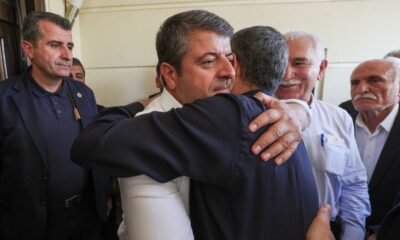
 Politics3 days ago
Politics3 days agoTurkish govt reinstates CHP mayor arrested on corruption charges
-
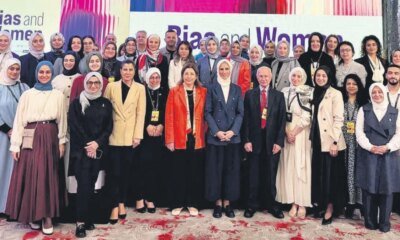
 Daily Agenda2 days ago
Daily Agenda2 days ago‘There is a systematic industry behind Islamophobia’
-

 Sports3 days ago
Sports3 days agoRising Turkish amputee footballers eye 1st team glory in heat
-
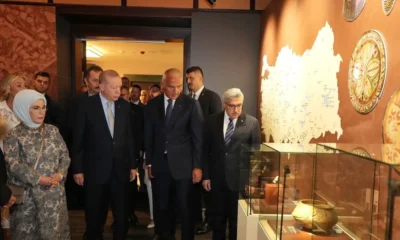
 Daily Agenda3 days ago
Daily Agenda3 days agoThe summit of archeology is in Beştepe: 12 thousand years of memory of Anatolia is exhibited at the house of the nation
-
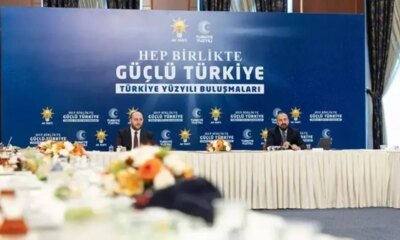
 Daily Agenda3 days ago
Daily Agenda3 days agoAK Party, 81 provinces landing in the field: ‘Türkiye Century Meetings’ begins!
-
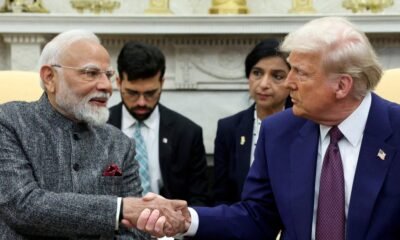
 Economy3 days ago
Economy3 days agoTrump to add another 25% tariff on India over Russian oil purchases




